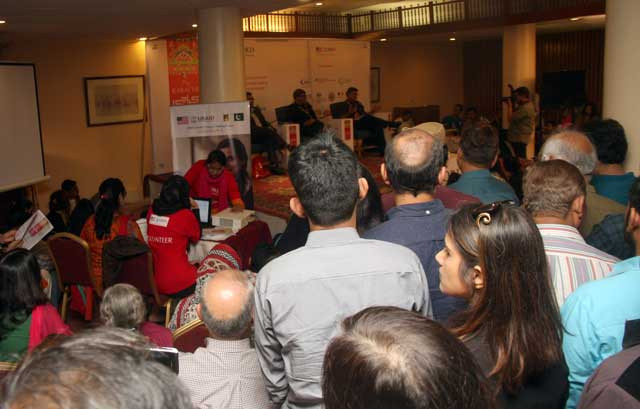Question what you’re told
Panelists discuss myths present in Pakistani society and their impact on the people

PHOTO: EXPRESS/ ATHAR KHAN
“In 1712 in Lahore, there was a riot and a lot of Imambargahs were burnt because there was a rumour that the Mughal emperor had become a Shia, so when we talk about sectarianism it has existed in different forms,” related moderator Yaqoob Khan Bangash.
“If you challenge certain myths with facts and references nobody is willing to believe you,” claimed Paracha, who explained that institutions such as the National Accountability Bureau are aiming to change the narrative but the myths are so ingrained in our society that this is very difficult.
When girls education takes a backseat
Under Bhutto, a whole new ideology was introduced where the subject of Pakistan Studies was brought into schools, he claimed. He brought together people to sit down and create a whole new ideology for Pakistan and that was that, Paracha said.
Dr Hoodbhoy defined the “difficult” word cognitive dissonance as someone seeing and hearing one thing but understanding and believing something completely different. “If you are provided ample evidence disproving something and yet your faith in it remains firm, this is called cognitive dissonance,” he explained. He related anecdotes from a novel, ‘When Prophecy Fails’ by Leon Festinger and Stanley Schachter, speaking of people blindly believing pseudo-religious prophecies of doomsday and donating riches to the perpetrators of these myths. Their faith built, despite ample evidence to the contrary, he added.
We have been told for years that terrorist attacks, especially suicide bombers, cannot be Muslims, said Dr Hoodbhoy. According to him, people like General Hamid Gul, Dr Shahid Masood and Ansar Abbasi are conspiracy theorists who spread these kinds of myths in society. We must discuss the reasons why people claim these terrorists cannot be Muslims, he said. “If they are Muslims then we must accept the fact that they acted according to their beliefs and will be punished in the next life, not this one. But no one wants to accept this,” Dr Hoodbhoy.
“There are nutcases at every level,” claimed Paracha. According to him, one of the main problems in society is the “information overload” caused by the emergence of the internet. “People want ready-made, simple answers. They don’t want to flex their brains,” he lamented.
“In the myth-busting war, there is one side that will literally bust you,” commented Bangash. Paracha expressed his agreement and said there were no shortcuts to solving the problem. “We have to begin with education. Children must be given education with critical thinking skills,” he explained, adding that something must be done about the media.
“The new generation is looking for answers. They aren’t [easily] convinced anymore,” he claimed.
The session ended with the agreement that the problem lies in society, as we do not allow our children to question things, be it at home or in the classroom.



















COMMENTS
Comments are moderated and generally will be posted if they are on-topic and not abusive.
For more information, please see our Comments FAQ